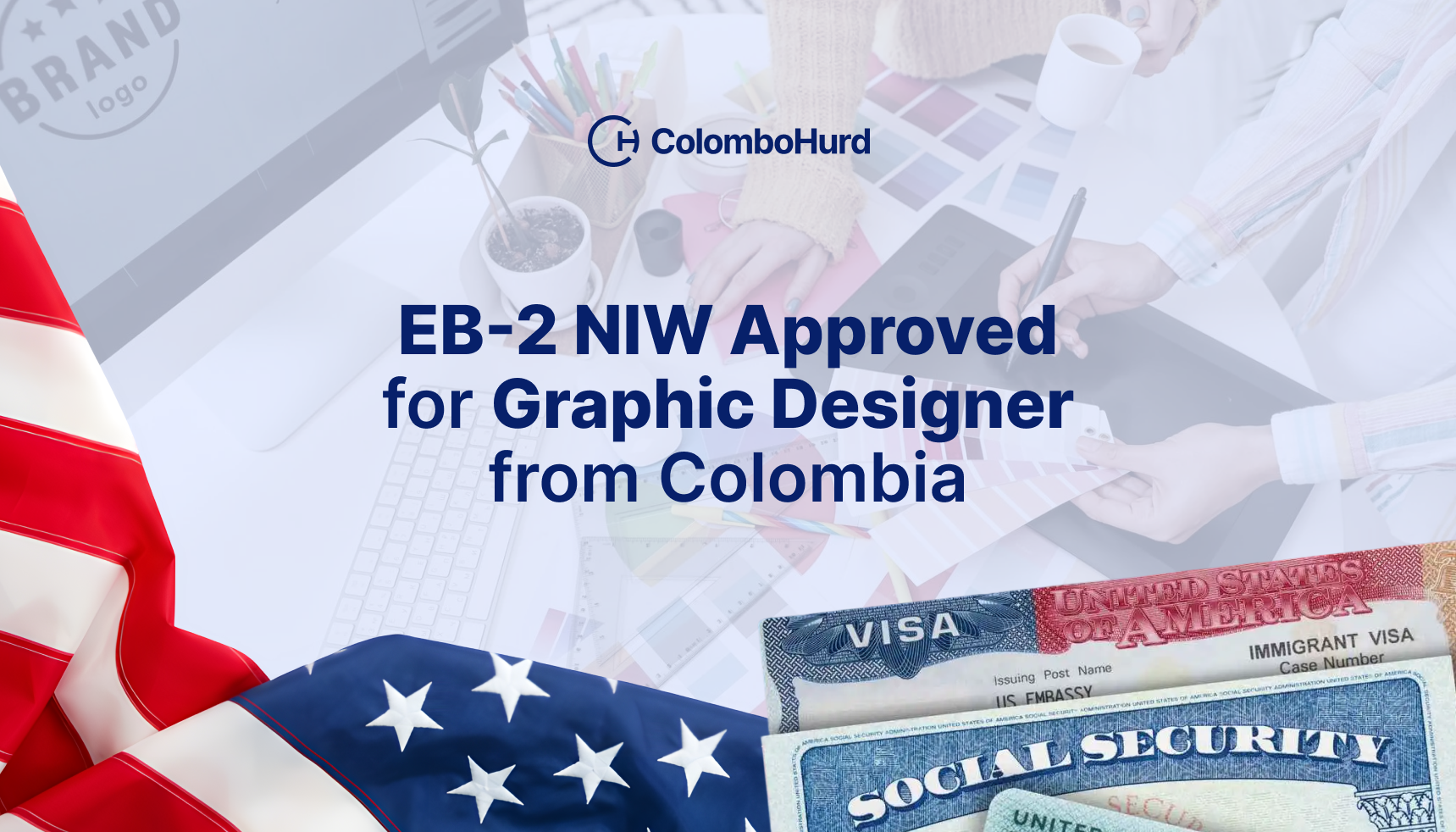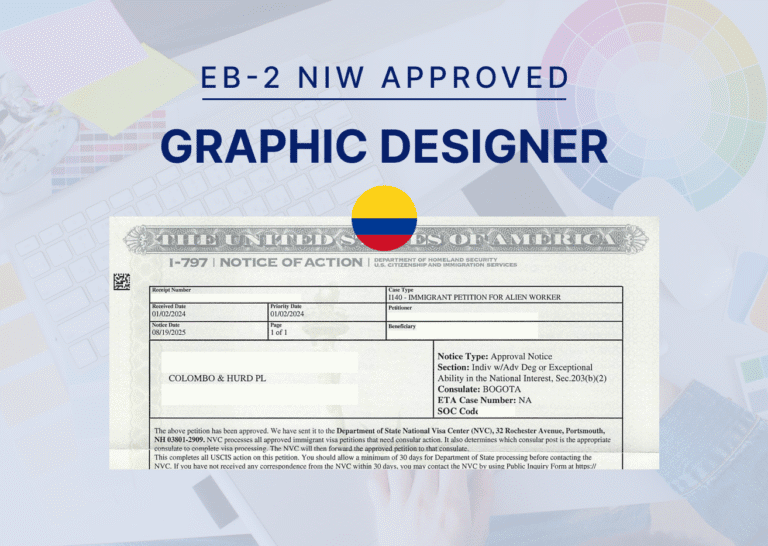Nearly 40% of food in the United States goes uneaten each year, costing more than $400 billion annually, filling landfills, increasing greenhouse gas emissions, and deepening food insecurity. To help combat this issue, our client, a Colombian graphic designer and marketing professional, developed innovative solutions that enable small and medium-sized enterprises (SMEs) in the U.S. food industry to reduce waste, improve efficiency, and adopt sustainable practices. Her EB-2 National Interest Waiver (NIW) was recently approved.
In this case study, Colombo & Hurd RFE Director Roshn Vazhel explains how our team built a strategy to evidence the national importance of her work. With approval secured on August 19, 2025, she is ready to expand her model nationwide, helping SMEs grow profitably while contributing to broader sustainability goals.

Turning Marketing Strategies Into Food Waste Solutions
From her early career in graphic design to becoming a leader in trade marketing and consumer psychology, this Colombian professional has spent more than two decades shaping how businesses connect with consumers. She holds a Bachelor’s degree in Graphic Design and has built over five years of progressive experience in marketing and advertising.
Her mission is ambitious yet clear: to help small and medium-sized enterprises (SMEs) in the U.S. food industry thrive while reducing food waste. By blending creativity with data-driven strategies, she develops tools that turn sustainability into both a business advantage and a public good.
The client’s approach equips SMEs with practical, low-cost tools to cut waste and improve operational efficiency. These tools not only strengthen food security but also support the U.S. 2030 Food Loss and Waste Reduction Goal.
Her efforts are exactly the kind of contributions that U.S. policy seeks to encourage and protect. Supporting this view, Mr. Vazhel highlighted:
“This type of distinctive, innovative work that addresses a national priority is another example of why EB-2 NIW is a strong pathway—the self-petitioned nature allows petitioners to tackle nationally urgent issues creatively and free from the limitations of the labor certification process.”
Can Marketing Innovation Truly Be a Matter of National Interest?
USCIS recognized that our client qualified as an advanced degree professional with substantial merit and that she was well-positioned to advance her endeavor. Yet, the agency issued a Request for Evidence (RFE) centered on one question: national importance.
Although USCIS acknowledged the seriousness of the food waste crisis, it questioned whether her ARCV Model, designed for SMEs, could have an impact beyond individual businesses. The challenge became clear: prove that her endeavor addressed a national priority in a way that was broad, scalable, and policy relevant.
In the words of Mr. Vazhel, who led the strategy:
“National importance is one of the more nuanced aspects of an EB-2 NIW petition, and officers can wield their discretion more widely for this prong and have been increasingly doing so in recent times. This is an example of why working with experienced legal professionals is important for success—while the national importance of a project may be clear to the petitioner due to their expertise, it is the act of ensuring that the widest possible range of officers agree and adjudicate favorably that demands flexibility, creativity, and experience.”
See if you qualify
Get your free EB-2 NIW profile evaluation today.
How We Connected Marketing Innovation to National Priorities
To overcome the RFE, our response had to go beyond adding more evidence. It needed to reframe her endeavor as a national solution. Our strategy focused on two things: clearly explaining the client’s project and showing how it ties into national priorities with solid evidence.
Explaining the endeavor: We explained that at the heart of her work is the ARCV Model, a framework helping small and mid-sized food businesses cut waste, boost efficiency, and strengthen local food systems. By blending marketing, behavioral science, and sustainability, she reshapes how food is sold and consumed, encouraging smarter choices and reducing surplus. The result is a model that helps businesses thrive while advancing national goals like waste reduction, lower emissions, and food security.
Proving national importance: We then connected her endeavor to the bigger picture. Rather than presenting policies in isolation, we showed how her work fits into the U.S. effort to reduce food waste. For example, her model supports the national goal to cut food waste by 50% by 2030, aligns with the National Strategy for Reducing Food Loss and Waste, and complements provisions in the Farm Bill. It also strengthens food access initiatives and supports USDA priorities around supply chain resilience. In short, her project doesn’t just help individual businesses; it directly contributes to national sustainability goals.
Projecting future results: To make the impact tangible, we also presented measurable outcomes. Each year, her model is projected to prevent tons of food waste; avoid CO₂ emissions; enable SMEs to achieve faster product turnover; boost revenues in key categories; and reach many U.S. consumers with more sustainable food options.
These numbers made it clear that her endeavor was both achievable and scalable, underscoring its value to the national interest. As RFE Director Vazhel emphasized:
“While officers can vary in their usage of discretion when adjudicating national importance, the presentation of accurate projections when accompanied by factual information is highly favorable – as they will be at best a layman in the particular petitioner’s field, numerical projections and facts can give them a better sense of overall.”
Want to learn how supporting small and medium-sized enterprises can strengthen your EB-2 NIW case?
Read our article on leveraging SMS support in EB-2 NIW petitions.
EB-2 NIW Approval: Opening Doors for Sustainable Marketing in the U.S. Food System
USCIS granted her EB-2 NIW, confirming that her work empowers SMEs, promotes sustainability, and strengthens the U.S. food system.
RFE Director Vazhel captured the outcome this way:
“The method by which she is going to positively impact the United States is truly unique and represents an opportunity to address an issue of national importance to the United States from a novel angle and through our RFE response strategy and brief we were able to illustrate that to the officer successfully.”
With her EB-2 NIW secured, she is ready to expand the ARCV Model across U.S. markets by partnering with SMEs, launching pilot programs, and creating educational campaigns that encourage smarter food choices.
Key Takeaway
The EB-2 National Interest Waiver recognizes contributions with national impact, giving professionals the opportunity to bring their expertise to the United States to strengthen industries, drive innovation, and support long-term goals. At Colombo & Hurd, we are committed to helping professionals navigate this process so their vision and work can thrive and contribute to America’s growth.
Interested in more stories of professionals driving impact for U.S. small businesses?
Read our case study about a Brazilian finance professional whose NIW approval is helping strengthen U.S. SMEs.
“This is an example of why working with experienced legal professionals is important for success, while the national importance of a project may be clear to the petitioner due to their expertise, it is the act of ensuring that the widest possible range of officers agree and adjudicate favorably that demands flexibility, creativity, and experience.”


